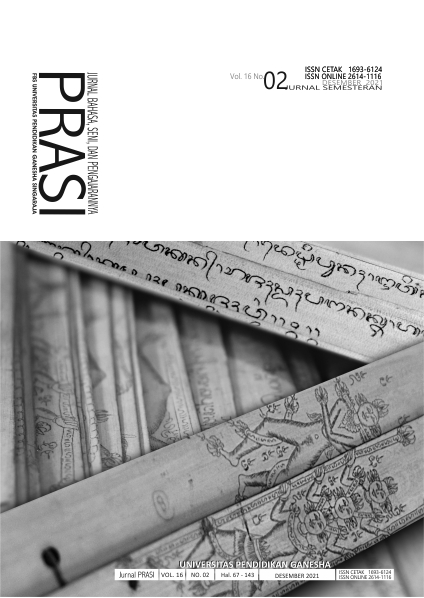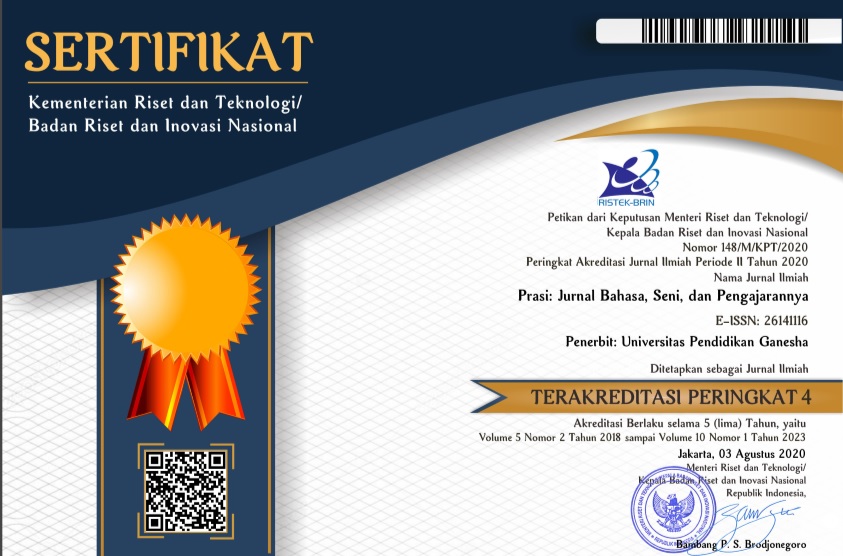AN ANALYSIS OF THE JARGON EXPRESSIONS IN THE CRUISE LINE
DOI:
https://doi.org/10.23887/prasi.v16i02.30549Keywords:
jargon, the meaning of jargon, the function of jargon, cruise line crews, hotel operational division.Abstract
ABSTRACT
The jargon used by the crews in housekeeping and food and beverage service department in the cruise line was analyzed in this research. The jargon expressions in these departments have special meaning that confused the other people outside the group. The jargon used in this department. This research used descriptive qualitative research with the basic interpretative studies to understand the meaning of every jargons in the cruise line crews related to the crews working experiences interacted with the guest around them. The open questionnaire and the interview guide were used to collect the data from 4 subjects of the study working experiences in the cruise line. From two subjects that worked in the housekeeping department, there were 116 jargons expressions that were classified into four jargon forms. There were 24 jargons in a word form, 37 jargons in phrase form, 40 jargons in abbreviation form (initialism type), 10 jargons in abbreviation form (shortening type), and 5 jargons in acronym form. From two subjects that worked in the food and beverage service department there were 136 jargons expressions that were classified into four jargon forms. There were 27 jargons in word form, 77 jargons in phrase form, 19 jargons in abbreviation form (initialism type), 8 jargons in abbreviation form (shortening type), and 4 jargons in acronym form. Every meaning of the jargon expressions were suitable with the department condition and situation. There are four functions of jargon expressions. Those are able to provide a clear and unambiguous term, promoting their group solidarity and exclude as out-groupers, marking the group membership, and representing the product. This research can be used as a reference to know the jargon used in the cruise line hotel operational division.
References
Adriadi, P. (2010). The Functions and Responsibilities of Foods and Beverages Product Division in Sahid Jaya Hotel Solo. 1-39.
Allan and Burridge. (2006). Forbidden Words: Taboo and the Censoring of Language. Cambridge: Cambridge University Press.
Andrew. (2017). Types of English Abbreviation. Retrieved from Crown Academy of English: https://www.crownacademyenglish.com/types-english-abbreviations/
Ary, Jacobs and Sorensen. (2010). Introduction to Research in Education. USA: Wadsworth Cengage Learning 10 Davis Drive Belmont, CA 94002-3098.
Balthazard, C. (2015). What does it mean to be a professional? Retrieved from HRPA (Human Resources Professionals Association: hrpa.ca/Documents/Designations/Job-Ready-Program/What-it-means-to-be-a-professional.pdf
Brown and Attardo. (2009). Understanding Language Structure, Interaction, and Variation: An Introductin in Applied Linguistics and Sociolinguistics for Non-Specialist. Michigan: University of Michigan.
Cannon, G. (2011). Abbreviations and Acronyms. Duke University Press, 107.
Crystal, D. (2003). The Cambridge Encyclopedia of the English Language. New York : Cambridge University Press.
Firdaus, A. (2011). Hotel Housekeeping. Retrieved from Hotel Housekeeping: Hotel Housekeeping: http://housekeeping-department.blogspot.com/2011/05/hotel-housekeeping.html
George, Y. (2006). The Study of Language 3th Edition. USA (United State of America: Cambridge University Press, New York.
Halligan, N. (2004). A Short Course on Writing Technical Report. Retrieved from Technical Writing Course: http://www.technical-writing-course.com/index.html
Izura and Playfoot. (2011). A normative study of acronyms and acronym naming. Behavior Research Methods, 1-29.
Juddin, M. N. (2017). The Jargon Used by Employees of Food and Beverage Service (FBS Division) at Hotels. jurnal.uin-antasari, 93-119.
Marantika, Budasi, Wedhanti. (2020). An Analysis of Jargons Used by the Human Resources Department at the Lovina Bali. Language and Education Journal Undiksha, 25-29.
Miles and Huberman. (1994). Qualitative data analysis: An expanded sourcebook (2nd ed.) thousand oaks. CA: Sage Publisher.
Nordquist, R. (2019). Deffinition and Example of Jargon. Retrieved from ThoughtCo.: https://www.thoughtco.com/what-is-jargon-1691202
Patoko and Yazdanifard. (2014). The Impact of Using Many Jargon Words, while Communicating with the Organization Employees. American Journal of Industrial and Business Management, 567-572.
Pradipta, K. T. (2017). An Analysis of Jargons Used by Receptionists in Front Office at Grand Istana Rama Hotel. ejournal.undiksha, 1-9.
Rebrina and Generalova. (2019). Professional jargon units in workplace communication (by the example of professional language of miners, oilmen, railway workers and ambulance doctors). IOP Conference Series, 1.
Seli, S. (2019). Word Formations of Jargon Used in the US Military in the Expandables 3 Movie. JELLT, 13-19.
Tudor, O. C. (2018). Vocabulary Acquisition in ESP: Perspectives, Strategies and Resources / L'Acquisition Du Vocabulaire Specialise: Perspectives, Strategies Et Ressources / Însusirea Vocabularului Specializat: Perspective, Strategii ȘI Resurse1. ResearchGate, 171-181.
Wright, N. (2010). Keep It Jargon-Free. Retrieved from plainlanguage.gov: https://www.plainlanguage.gov/resources/articles/keep-it-jargon-free/
Downloads
Published
Issue
Section
License
Authors who publish with Prasi agree to the following terms:- Authors retain copyright and grant the journal the right of first publication with the work simultaneously licensed under a Creative Commons Attribution License (CC BY-SA 4.0) that allows others to share the work with an acknowledgment of the work's authorship and initial publication in this journal
- Authors are able to enter into separate, additional contractual arrangements for the non-exclusive distribution of the journal's published version of the work (e.g., post it to an institutional repository or publish it in a book), with an acknowledgment of its initial publication in this journal.
- Authors are permitted and encouraged to post their work online (e.g., in institutional repositories or on their website) prior to and during the submission process, as it can lead to productive exchanges, as well as earlier and greater citation of published work. (See The Effect of Open Access)


.png)
.png)









